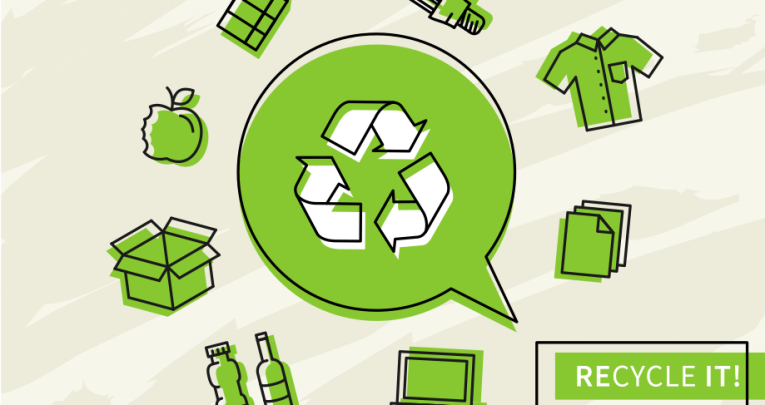The 5 steps to taking control of your nursery’s waste

“Your environmental management plan could be the deciding factor for parents choosing a nursery for their child.”

- by Laura West

Environmental concerns have never been higher up the agenda than they are today – so much so that your environmental management plan could be the deciding factor for parents choosing a nursery for their child.
Parents want their children to have the best possible start in every way, and a more eco-friendly setting may just have the edge.
So how green is your nursery? Generally speaking, nurseries will have a low-to-moderate impact on the environment.
Reducing your waste, and managing how you dispose of it, is the main area you have control over and also the area where your policies can have the biggest effect.
Managing waste
There are five stages to a waste-management hierarchy:
- Prevention
- Preparing for Reuse
- Recycling
- Other Recovery
- Disposal
So how can you use this system within your nursery?
1 | Prevention
How can you reduce waste in your nursery? This could be in the form of purchasing products with little to no packaging or maybe keeping products for longer and replacing them only when necessary.
Growing your own veg eliminates packaging as well as teaching children all about the field-to-fork ethos.
2 | Preparing for Reuse
This is a stage that people don’t often think about, but it can have a huge impact.
For instance, instead of throwing your printer ink cartridges away, return them to your supplier so they can be refilled and reused, thereby creating no waste at all.
Another form of preparing for reuse could be using scrap paper. Paper that has been printed on on one side only can be reused before it is recycled – try creating a scrap notepad for messages or for the children to draw on.
As every good nursery practitioner will tell you, never throw away an old toilet roll: collect these along with other empty packets, such as washing-up liquid bottles and cereal boxes, and reuse them as modelling/craft materials.
3 | Recycling
A very simple approach to controlling what gets sent to landfill is bin segregation, and this can play a major part in recycling.
It’s one of the easiest ways to manage waste and, generally speaking, if you give people the choice, they will opt to recycle – even if it’s just putting a coffee cup in the right bin at the railway station, we all try to do our bit!
Within your nursery it’s a good idea to have a three-bin system running (not including nappy bins in bathrooms). One bin should be for anything that can’t be reused but can be recycled, such as paper, card, plastic and glass.
It’s worth checking with your local council to see exactly what can be put in here, as it will vary by location.
A food waste bin is another option – this can be used to collect any leftover food products from mealtimes and the kitchen.
If you have a growing garden, waste food can be added to a composter each day and eventually recycled into compost to help grow your delicious crops.
(While we are talking about growing gardens, making use of a water butt and collecting rain to irrigate your crops is another brilliant example of recycling.)
Your final bin should be for collecting general household waste – items that cannot be recycled or reused and are not classed as hazardous waste (batteries, electrical goods or clinical waste, etc).
4 | Other Recovery
This is much harder for a nursery to manage and is designed for more industrial use. Other Recovery means the use of anaerobic digestion or incineration, with the energy this produces recovered to be used as fuel heat or power.
5 | Disposal
This is for anything that cannot fit into one of the above categories. General household waste will often end up in landfill, but not everything can use this option.
There are strict rules around disposal, and the one that applies most to nurseries is offensive/hygiene waste – in other words, dirty nappies.
Used nappies, wipes and used PPE (personal protective equipment) cannot be thrown into household waste by commercial businesses. Instead, within changing rooms and bathrooms, you should be using proper nappy bins.
Swing bins are simply not acceptable, and by using a fit-for-purpose nappy bin you can protect against the spread of germs as well as unpleasant smells.
The bin liners used are yellow, and when they are emptied, they must be disposed of in a separate yellow bin.
This is generally supplied and emptied by a third-party company that will dispose of the waste responsibly in accordance with the Environmental Protection Act 1990 (including the Duty of Care Regulations), Controlled Waste Regulations 2012, Hazardous Waste Directive 2011 and the Carriage of Dangerous Goods Regulations.
Saving energy
To reduce your energy waste, turn off lights and heating in rooms that are not being used, and switch off electrical items when they are not required.
You can also be smarter when you are using devices – in the summer months I’m forever seeing air-con units working full blast next to wide-open windows.
Having a window open allows hot air to escape thus making the air-con unit work harder and longer; simply closing the windows and lowering the blinds to prevent the sun glare will help keep your room cool and air-con units working far more efficiently.
Free flowing to the garden is something that can increase your energy usage, but installing external doors with PVC curtains will allow the children free access and help to retain the hot (or cool) air, minimising energy waste.
Finally for this article, your roof insulation, doors and windows can all have an impact on energy waste. Unfortunately, they can be costly to replace.
A more cost-effective step might be to encourage staff to car share for their journey to work, reducing the number of vehicles on the road as well as increasing available parking at your setting.










